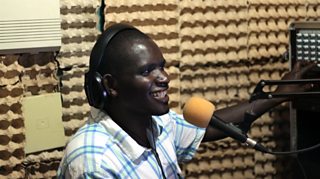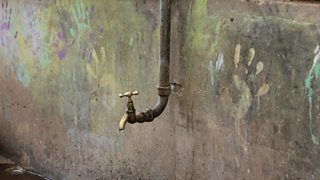Tackling cholera through radio in Kenya
David Njuguna
Mentor, ΒιΆΉΤΌΕΔ Media Action Kenya

Kamadi, presenter at Mtaani Radio in Nairobi, Kenya
For World Health Day, we look at how a volunteer-run local radio station is helping prevent cholera in Kenya.
Last year Kenya was facing a devastating cholera outbreak. It started in the capital, Nairobi and by June 2015, a total of 4,937 cases and 97 deaths had been reported nationally.
According to public health officials, the spread of cholera in Nairobi particularly affected people living in slums. Frequent bursting of sewer lines, poor sanitation facilities and heavy rains played a major role in the outbreak. Poor hygiene practices – such as not washing hands before eating or preparing food – also contributed to the spread of disease. The outbreak eventually petered out, but the environment and practices that contributed to the spread of cholera continue to pose a threat.
In a quiet courtyard, away from the hustle and bustle of Nairobi’s Kawangware slum, a community radio station was planning a response.

A tap outside Mtaani Radio
Local radio
Mtaani Radio, run by a team of volunteers, was a hive of activity when I walked into their studio last week. They were recording content for ‘WASH Wednesdays’, a show looking at ways listeners can improve their health and hygiene. The show, reaching over 100,000 people in the Kawangware community, was just about to start.
“It’s time we the people of Kawangware demanded our constitutional right of access to clean water from the government. This will go a long way in reducing outbreaks of water-borne diseases” said Kamadi, editor and presenter of the show.
“It’s also our responsibility to ensure we treat or boil drinking water before consumption so that we can reduce the amount of time and money we spend seeking medical attention” he continued. “A healthy country is a productive country.”
The show included questions texted in from listeners and an interview with a public health official who provided advice on avoiding cholera.
As a ΒιΆΉΤΌΕΔ Media Action mentor, helping them produce creative, engaging and interactive content on WASH (Water, Sanitation and Health) issues, I’m pleased. This show is exactly the content we’d been working towards.

David Njuguna mentoring a presenter at Mtaani Radio
During the outbreak last year, one thing public health officials did to control the spread of cholera in Kawangware area was to close down food vending kiosks that failed to meet the required health standards. In support of this initiative, Mtaani Radio produced public service announcements (PSAs) targeting food vendors and their customers to raise awareness on the importance of observing hygiene to reduce the risk of contracting cholera.
Dirty milk
Here’s an excerpt from one of the PSAs, aired 5 times a day to ensure maximum reach:
Vendor: Fresh milk for sale!
Customer: Could I have some for twenty shillings?
Vendor: Right away mam
(Starts to serve the customer)
Customer: That cup is so dirty and you are serving me without washing it first! That will make us sick. I don’t want milk anymore!
Announcement: Do you know that washing can prevent diseases like cholera, diarrhoea, typhoid and other dirt and water-related diseases? Be wise and wash your utensils with clean water before using them.
Vendor: Now I know. I will be washing all my utensils before serving my customers.
The PSAs reflect common scenarios in local shops, and are acted out in local accents. They are powerful examples of how local radio can relate to their communities in ways national radio may not.
They are having real impact too.
One listener told Mtaani Radio staff, “[After hearing a PSA] My child challenged me to wash my hands before serving her food, because of what she’d heard on the radio.”
After the tragedies of last year, the threat of cholera is never far from our minds. Tackling cholera requires sustained effort, before, during and after an outbreak. I’m very happy Mtaani radio is revisiting the topic.
Related links
Follow us on , and
